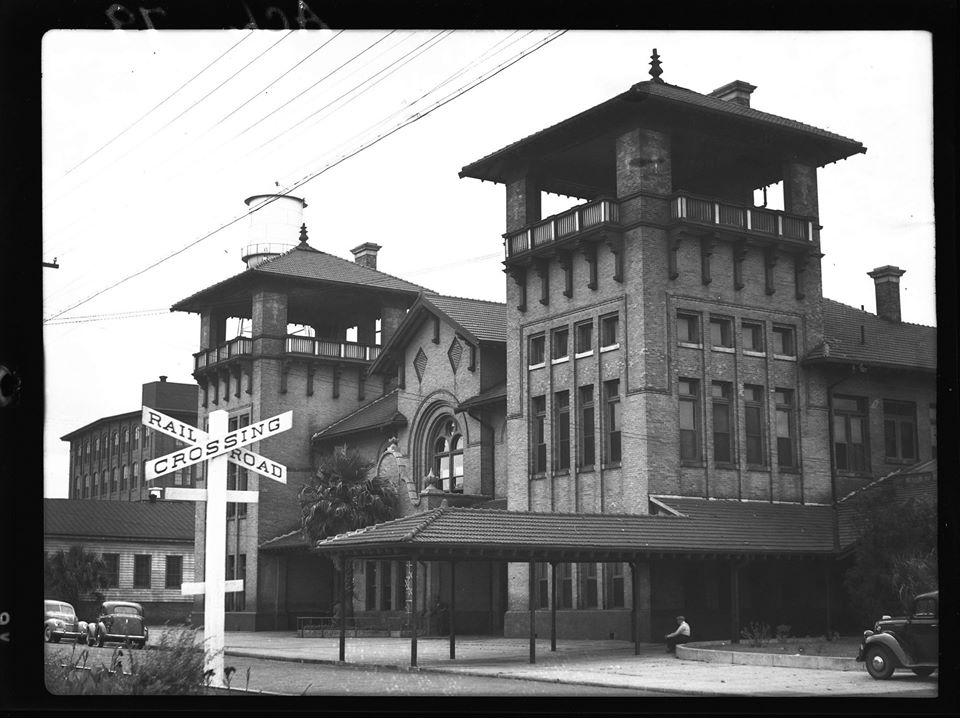





PUTTING THE PIECES BACK TOGETHER
1941 - 1992
1943
June 24 -- Rueben Morris Greenberg IV was born to a Jewish immigrant father and African-American mother. In 1982 Greenberg became Charleston's first African American police chief. An article written by the National Review upon Greenberg's retirement in 2005 credited him with turning "the... Police Department into a national model. In the process, he became a celebrity and a source of pride for the city."
1945
Jan. 24 -- The Christ Church (Mt. Pleasant) flagon was returned to the Rev. Edmund Coe by Bonnie McArty, whose uncle Frank Blaine, a Union infantryman, stole it following the 1865 Confederate evacuation of Charleston. (Source: Stolen Charleston: The Spoils of War, p. 11.)
June 18 -- The Ben Sawyer Bridge, connecting the mainland to Sullivan's Island and the Isle of Palms, was officially opened. The Pitt Street Bridge was closed to. traffic.
1947
Jan. 10 -- Union Station was destroyed in a fire that started in an oil stove by the ground-floor newsstand that “just flared up.”
Jan. 13 -- A story in the Evening Post recorded that fate had “taken a hand in the problem of providing Charleston with the type of railway passenger facilities a community of this size and prospects is entitled to” as it reported on the fire that destroyed Union Station.
Dec. 25 -- Henry Dees III was born in Charleston. After two years at The Citadel (Dees Hall was named after his father), Dees completed a degree in acting from the North Carolina School of the Arts. He began his career in New York as a stage actor before moving to Los Angeles to star in the film "Two-Minute Warning," and soon thereafter he earned guest spots on the television show "Wonder Woman." He continued acting until 1991 when he went into advertising sales for Moving Pictures International and Variety Magazine.
1948
April 1 -- John Stewart Carter was born in Little Rock, Ark. Shortly after marrying his second wife in 1981, the couple moved to her hometown of Charleston. John taught at The Citadel, becoming Head of the Department of Health, Exercise and Sport Science. Col. Carter also was the Bulldogs' play caller. As founder of the Citadel's Ombudsman program. Col. Clark help the Citadel community during its transition to coeducation in the 1990s.
1950
Dec. 26 -- Maria Louisa Porcher Wayne died.
1951
Aug. 29 -- Seventy-three orphans left the Charleston Orphan House for the last time before it was torn down to make room for a new Sears Department Store.
Nov. 10 -- Randolph Martz was born in Cleveland, Ohio. Martz would become a classical architect who designed or renovated many Charleston buildings. From 1979 - 1984, he worked for H.A. DaCosta, specializing in historic restorations. An avid traveler of more than 60 countries and student of ancient architecture around the world, Martz also served as a draftsman for the Tehran airport. He was a mentor for numerous Charleston architects, including Christopher Liberatos, taught at the College of Charleston, and gave hundreds of presentations before the Board of Architectural review, helping to shape the restoration, rehabilitation, preservation and construction of many of Charleston's buildings.
1954
Oct. 7 -- The News & Courier ran an article expounding upon the slow decline of Charleston's famed Mosquito Fleet.
1960
April 1 -- Twenty-four Black students from Burke High School staged a Civil Rights sit-in at the Kresse Department Store lunch counter on King Street, changing the city's dialogue about the issues facing racial equality.
April 30 -- According to a report in the News & Courier, the last column of the Charleston Hotel came down in a haze of dust and rubble shortly after 3 a.m.
Sept. 11 -- Hurricane Donna passed by the Carolina coastline, spawning a tornado that brought down three walls of the Bennett Rice Mill, c. 1844.
1964
May 12 -- According to an article in the News and Courier, a domestic rabbit was discovered by two members of the Footlight Players running loose on East Bay Street. The two put out a call for its owner and found him at a West Ashley address. The owner said he could no longer take care of the bunny or its mate, who was still in the owner's possession. He asked the acting group to find a new home for both rabbits, which they did. The rabbits' new residence was wth Robert M. Hollings on Queen Street.
1970
Oct. 9 -- A victim of termite damage and neglect, the Mills House Hotel, having been carefully demolished and reproduced using as much salvaged building materials as possible, reopened to the public.
1971
Feb. 11 -- The Wagner House at 6 Green Street on the College of Charleston campus was scheduled to be torn down to make way for the new library. Upon hearing the news, preservationists Elizabeth Jenkins Young and Jane Thornhill ran to the site and single-handedly stopped the proceedings and saved the house. (Source: Broad Street and Beyond, p. 42-43)
Oct. 17 -- Popular aviator Bevo Howard struck a tree and fatally crashed as he pulled out of a stunt at a charity airshow in Greenville, N.C.
1986
March 3 -- News & Courier columnist Ashley Cooper remembered the Charleston Hotel, calling it an iconic symbol of the city's antebellum glory, "one of the few remaining links with the romantic days of terrapin soup, gas lights, and visiting royalty."
1987
Dec. 15 -- Educator and Civil Rights leader Septima Poinsette Clark died.
1989
Sept. 21/22 -- At midnight, the eye of Hurricane Hugo, a category 4 storm, passed over Cove Inlet between Mt. Pleasant and Sullivans Island.
Dec. 25 -- Eight inches of snow fell, providing Charleston with its first - and to date only - documented White Christmas.








